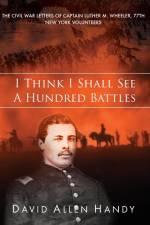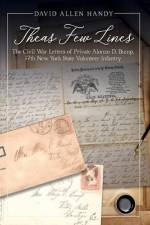av David Allen Handy
547
At 4:00 a.m., April 12, 1861, Confederate Lt. Henry S. Farley, commanding a battery of two 10-inch siege mortars, fired the first shot at the Union garrison in Fort Sumter. The shell exploded above the fort, showering the deserted parade ground with fragments of hot iron. That one shell ushered in the bloody epic of the American Civil War. Seven-hundred-fity thousand men, perhaps more, were killed in battle, died from wounds, or from disease. In addition, 400,000 were wounded and many of those lived the rest of their lives with amputated arms and legs. Numerous others battled post-traumatic stress disorder and other psychological maladies.Four months after personally witnessing the sweeping rout of the Yankee army at Bull Run, Congressman James B. McKean of Saratoga Springs, New York, issued a circular to his constituents calling for the formation of the Bemis Heights Battalion, subsequently designated the 77th New York State Volunteer Infantry. Electrified by the spirit of patriotism that swept through Saratoga like a wildfire, and the determination to join in the fight to put down the "unholy rebellion," twenty-one-year-old Luther Miller Wheeler offered his aid to B.F. Judson of The Saratogian newspaper in recruiting a company for the regiment, despite his mother's severe misgivings. She fervently sought to dissuade Luther from "taking any steps which should separate him from her, for he was dearer to her than her own life." But to his mother's forceful protestations, Wheeler invariably replied, "Someone has got to go to help put down this rebellion and I am not better than anyone else that I should be excused." His mother reluctantly relented only when he firmly declared, "You must give me up, as I have given myself up."I Think I Shall See a Hundred Battles is a compilation with commentary of the Civil War letters Luther M. Wheeler. His war correspondence entailed letters to his mother, brothers Frank and Wendell, and his sister Abigail. In his letters, Luther boasted of his robust health and fitness for military life and eagerly sought promotion to higher rank. He wrote of military life, Northern politics, Union war strategy, the courage and bravery of the Confederate soldier, the carnage of battle and aftermath, the Emancipation Proclamation, slavery and contrabands, Army commanders, and struggled with the role of Providence in the war. Wheeler also eagerly sought news from home, especially of his friends doings and who was courting whom.Luther Wheeler mustered into service September 24, 1861, commissioned as first lieutenant. April 12, 1862, he was promoted to captain of company C. Wheeler saw battle during the 1862 Peninsula Campaign, South Mountain, Antietam, Fredericksburg, and 2nd Fredericksburg in 1863. His last letter was written May 2, 1863, to his mother. The next day, the Union VI Corps charged up Marye's Heights. In Albion Howe's division, the 77th New York assaulted the portion of Marye's Heights at Telegraph Hill. Leading his men up the hill, Luther was mortally wounded, dying a few hours later. His death was a terrible loss for the officers and men of the regiment. More than 2,000 mourners witnessed the committal service for burial at Greenridge Cemetery. Col. McKean offered the final words: "Captain Wheeler! My heroic young friend, you have not died in vain. The flag of your country is going on to victory. The dear country for which you paid the price of your precious life shall yet be saved. No, you have not died in vain."


